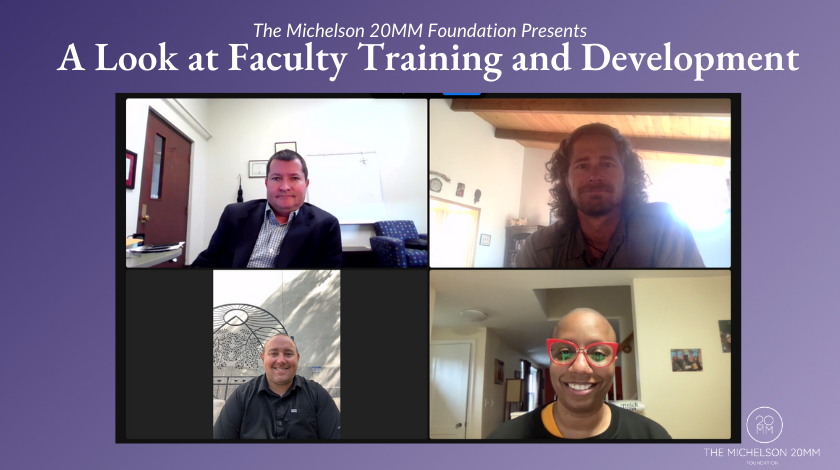By Kenia Miranda Verdugo
As the Department of Education reinstates Pell Grant eligibility for incarcerated students in July of 2023, the amount of students who will now qualify for federal funding will increase and so will the need for more faculty. Given the increased demand and unique needs of the student population, it is critical to provide faculty training and professional development programs that will ensure high-quality programming in prison. As colleges and universities prepare to train their faculty members, we must ask ourselves: What makes for great faculty in prison? This question was the focus of Teaching Higher Ed in Prison: A Look at Faculty Training and Development.
The conversation was led by one of Michelson 20MM’s Spark Grantees, Cerro Coso Community College, who used their grant to assist in developing an openly licensed faculty training and professional development program for Higher Education in Prison (HEP) programming. Cerro Coso’s leadership in the growth of the California Justice Reform, specifically in influencing higher education in prison reform, stems from building and sustaining the nation’s largest face-to-face prison college program. Through the Spark Grant, Cerro Coso catalyzed training curriculum development and leveraged a community of practitioners to achieve additional grants, sustainable funding, and ultimately provide well trained faculty for incarcerated students.
The Conceptual Framework
While Cerro Coso Community College was creating and expanding their higher education in prison programming, they came to the realization that there was no formalized training for faculty members; in fact, the default was almost always compliance-based training. Recognizing the need, they created a conceptual framework of compliance systems, organizational training, and professional development.
At a systems level, there is compliance-based training that’s often required: legal standards, adherence to law, access security requirements, etc. Generally such compliance is taken care of and or required by the Department of Corrections. For the professors within the prisons, however, there was an absence of organizational training, which includes procedures such as onboarding, reading assignments, and writing syllabi. Lastly, Cerro Coso directly incorporated professional development training for their own faculty, better equipping them to support their students inside prisons.
Faculty Support
After learning about Cerro Coso’s framework, the panelists discussed why support for faculty within prisons is necessary and how this need is highlighted when the educational programs are being created. Dr. Andrew Beckett, associate dean at the University of Iowa, talked about the differences between teaching in a university classroom versus teaching in a prison classroom. He mentioned that students on the outside simply discuss subject-matter topics within the classroom; whereas, incarcerated students discuss prison life, which requires a lot of ongoing development for faculty on how to maneuver those sensitive topics. Dr. Beckett went on to share that, “[The University of Iowa] built a faculty development learning community, if you will, [that] just gave folks who are teaching an opportunity, on a weekly basis, to dialogue and talk about what are some of the issues and how we can help. There’s a lot of other issues that we dealt with that are more technical, like how do you do authentication, trying to log in behind bars when you don’t have a cell phone.”
Student Involvement
While support for faculty is needed on all levels, we must also recognize that to be successful, we must incorporate the students into the creation of the programming, the hiring of faculty members, and faculty training. Dr. Erin Corbett, founder and chief executive officer of Second Chance Educational Alliance, Inc., shared their model:
“We created a process where we would have a couple of released students, so former students of ours, look at the credentials of the person who wanted to teach. If they felt that those credentials were sufficient, we would ask that person to come in for a first round interview. The students would lead that interview process. Sometimes I didn’t even have to be there, which was even greater, because I think it provides students more of that autonomy and just kind of ownership of the process.”
Dr. Corbett continued to state that when you equip people with the knowledge, the understanding of the broad conceptual frameworks of what these trainings do, the faculty are far better able to understand how they themselves are situated within the context of this field, as well as where the students are situated. Faculty are then better positioned to serve the students well, so that the students are having the best educational opportunities that they can have.
To continue the conversation, faculty members and program educators are invited to join Cerro Coso’s Basecamp 2022 from June 8th – 12th, 2022. If you would like to learn more, we invite you to view the recording, read the full transcript, and access additional resources mentioned during the event.
Michelson 20MM is a private, nonprofit foundation seeking to accelerate progress towards a more just world through grantmaking, operating programs, and impact investing. Co-chaired and funded by Alya and Gary Michelson, Michelson 20MM is part of the Michelson Philanthropies network of foundations.
To sign up for our newsletter, click here.
